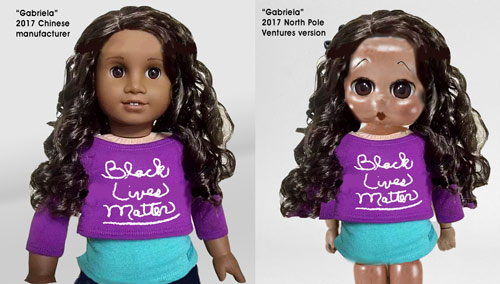Not So Merry Christmas? Mattel Pulls Its Iconic American Girl Brand From Santa Claus’ North Pole Toy Factory
Alleging Inadequate Standards, Mattel Sues Santa Claus’ Company Seeking an Order Barring It from Delivering American Girl Dolls; Millions of Children Fearful of Missing Toys Christmas Morning
By BUTCH WITT
Published December 16, 2017

ANCHORAGE, AK – The sounds of Christmas cheer and clanking of small tools was interrupted at the North Pole after the Santa Claus empire received a most unwelcome surprise – a lawsuit and cease and desist letter courtesy of one of Santa Claus’ largest venture partners, toy giant Mattel, Inc. According to the lawsuit, Santa’s quality control has fallen below Mattel’s standards and threatens the image of the brand with consumers, which consists of primarily girls ages three to 11. It also alleged that many of the materials used in the dolls – such as pine wood – are unsafe and expose Mattel to liability. Mattel has a long history with Claus. For 21 Christmas seasons, Mattel has licensed its American Girl brand to Claus’ toy manufacturing subsidiary, North Pole Ventures. The lawsuit, filed in the U.S. District Court in Anchorage, seeks to terminate the licensing arrangement and bar Claus from delivering American Girl dolls on Christmas Eve.
As any modern parent can attest, keeping a girl away from American Girl dolls (and branded paraphernalia) is a lot like trying to get through January without hearing about the Super Bowl. The market for American Girl products – including dolls, clothing, games, home décor, toys – is a $4.7 billion enterprise and Mattel’s second-most-profitable franchise after Barbie.
Since 1998 when Mattel purchased the brand, Mattel has outsourced its manufacturing through licenses with all sorts of companies: Glidden makes pink American Girl wall paint, Stride Rite makes sparkly American Girl shoes. Around Christmas season, by far Mattel’s largest licensee has been North Pole Ventures.
“Every year our affiliate Santas take about 15 million American Girl orders from hopeful children in shopping malls throughout the U.S.,” said a North Pole Ventures spokesperson, Samantha Frost. Although Frost would not comment on the allegations in the lawsuit, she denied that North Pole Ventures’ American Girl products were substandard or pose a hazard. “Our toys are safe and anyone who claims otherwise is defaming our dear little elves who work so hard to make children smile each Christmas,” she said.
Although Claus has not appeared publicly, he did post an early morning tweet slamming Mattel that some have criticized as insensitive and even anti-Semitic: “Xmas spirit? Jew bean counters in El Segundo put $ over children.”
Claus may be feeling the heat from his failure to reach a deal with Disney on Star Wars-branded toys. That rekindled franchise is anticipated to generate $1.2 billion in toy sales this Christmas season, but North Pole Ventures will be left in the cold. Weeks of negotiating failed to result in a license for Claus’ company. Although Disney suffered some immediate PR fallout, one source inside the company claims it was for the best. “Santa’s elves are falling further and further behind in their ability to make modern toys,” he said. “Kids don’t want Millennium Falcons made out of balsa wood.”
Toy industry expert Ted Etchesketcher said that if Claus loses the American Girl franchise, it will create friction with consumers. “When kids climb up on Santa’s lap at the mall, the last thing they want to hear is ‘try again’ or ‘that is not available this year.’” “Eventually,” he said, “the kids stop coming no matter how strong Santa’s own brand has been historically as a conduit for toys.”
Claus’ attorney, Los Angeles-based civil rights attorney Gloria Allred, issued a statement that North Pole Venture would respond “vigorously” and “countersue Mattel for fraud and breach of contract.”




